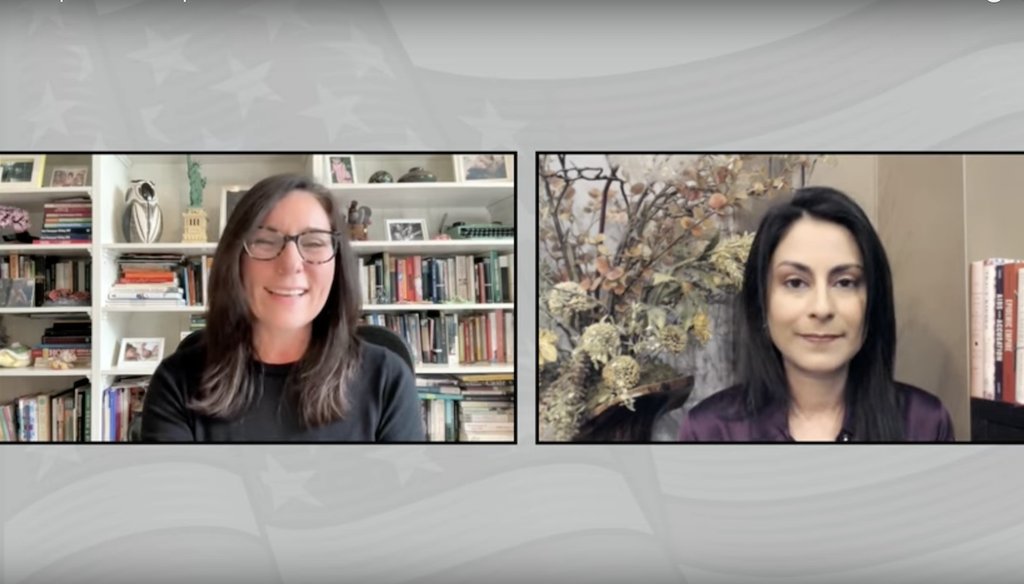Infection
PolitiFact – United Facts of America discusses: The profit motive driving anti-vaccine misinformation
As vaccine hesitancy rises and childhood vaccination rates fall, the real-world consequences of vaccine misinformation couldn’t be clearer: People will get sick. People will suffer.
During a Nov. 6 United Facts of America discussion, Dr. Céline Gounder, KFF Health News’ senior fellow and public health editor and an epidemiologist and infectious disease specialist, warned that we’ve recently seen outbreaks of measles in Ohio and cases of polio in New York.
“These infections will come back and they are not benign infections,” Gounder told PolitiFact Deputy Editor Rebecca Catalanello. “There’s a reason scientists doctors decided to develop vaccines against some of these infections.”
People who get severe measles can develop severe — and sometimes deadly — pneumonia or encephalitis, a brain infection that can cause seizures and other neurological problems, Gounder said. Measles can also be deadly. Polio can paralyze and kill people.
Gounder said that despite vaccine mis- and disinformation’s potentially deadly stakes, there’s a strong profit motivation for people who spread it.
“The people who are purveying vaccine mis- and disinformation will then pivot from, ‘These vaccines don’t work,’ or, ‘These vaccines are harmful,’ to, ‘But hey, I have something that will work for you or that will help educate you more,’” Gounder said.
Anti-vaccine activists such as Dr. Joseph Mercola, an osteopathic physician who spread misinformation about COVID-19 and the vaccines, “are all selling something at the end of the day,” she said. This can include anything from tickets to anti-vaccine conferences to herbals or supplemental products. “It is quite lucrative.”
Although anti-vaccine misinformation has been around since vaccines were created, Gounder said social media’s increasing influence and the COVID-19 pandemic changed the misinformation landscape. Technological advancements allowed anti-vaccine activists to efficiently monetize disinformation, she said.
The COVID-19 pandemic’s onset coincided with the 2020 U.S. presidential election, which meant that disease-prevention measures including COVID-19 vaccines became politicized. Gounder said this was predictable, and not unique to the U.S., pointing to the Ebola outbreak in West Africa in 2014.
“Several of the countries in the region had their own presidential elections at the time, and we saw the exact same thing happen,” Gounder said. “For example, ‘Ebola is a hoax,’ ‘COVID is a hoax.’ We saw the exact same language used in two entirely different settings.”
Gounder, who has dedicated much of her professional life to health communication, has also experienced anti-vaccine mis- and disinformation following personal tragedy. Her husband, the soccer journalist Grant Wahl, died Dec. 10, 2022, and anti-vaccine conspiracy theorists exploited his death.
Gounder said she expected as much. She called exploiting a celebrity or public figure’s death to promote anti-vaccine narratives the “playbook” for people who spread such disinformation.
“Basically, right after I informed family of his passing, I felt like I had to kick into gear in getting him transported back to the U.S. as quickly as possible to have an autopsy as quickly as possible to get information out about what was his true cause of death as quickly as possible,” she said. “I knew that there would be rumors and conspiracy theories about his death.”
Since the COVID-19 vaccines were first approved, PolitiFact has observed a similar pattern of misinformation, and has regularly debunked claims that athletes’ health incidents and that any number of sudden, unexplained deaths were linked to COVID-19 vaccines.
When a celebrity dies, Gounder said, “you will start to hear these false claims.” You might also see people she described as “fake experts” — people who are not immunology or vaccine experts making claims that COVID-19 vaccines caused a person’s death. She also warned people to watch for logical fallacies.
“The most common one is probably A came before B, so, therefore, A must have caused B,” Gounder said. “But that would be like saying, ‘Well, I took the subway to work today, so, therefore, the subway must have killed me.’”
The majority of the American population has received a COVID-19 vaccine, and knowing about these anti-vaccine misinformation maneuvers is an important way to combat them. It’s also important to stay positive, she said.
“The people who get things done are optimists,” Gounder said. “Part of what gives me optimism is optimism — is the fact that I and many of my friends and colleagues still have optimism that we can make a difference, because if you don’t, that’s when you’ve already given up and it’s really game over already.”
RELATED: United Facts of America to feature top-flight voices on elections, AI, vaccines
RELATED: How health incidents like Bronny James’ cardiac arrest fuel COVID-19 vaccine misinformation

